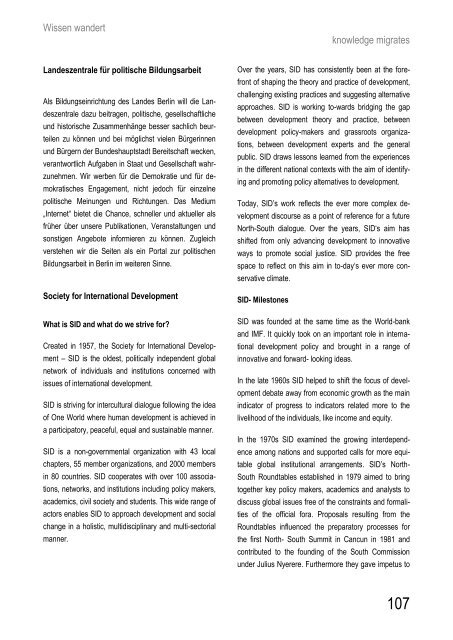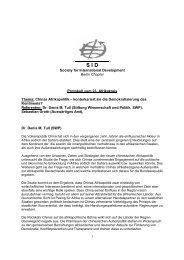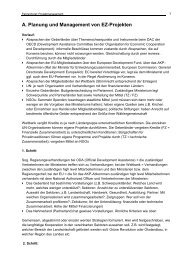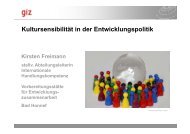Konferenzbericht (PDF-Dokument, 3 MB) - SID
Konferenzbericht (PDF-Dokument, 3 MB) - SID
Konferenzbericht (PDF-Dokument, 3 MB) - SID
Erfolgreiche ePaper selbst erstellen
Machen Sie aus Ihren PDF Publikationen ein blätterbares Flipbook mit unserer einzigartigen Google optimierten e-Paper Software.
Wissen wandert<br />
Landeszentrale für politische Bildungsarbeit<br />
Als Bildungseinrichtung des Landes Berlin will die Lan-<br />
deszentrale dazu beitragen, politische, gesellschaftliche<br />
und historische Zusammenhänge besser sachlich beur-<br />
teilen zu können und bei möglichst vielen Bürgerinnen<br />
und Bürgern der Bundeshauptstadt Bereitschaft wecken,<br />
verantwortlich Aufgaben in Staat und Gesellschaft wahr-<br />
zunehmen. Wir werben für die Demokratie und für de-<br />
mokratisches Engagement, nicht jedoch für einzelne<br />
politische Meinungen und Richtungen. Das Medium<br />
„Internet“ bietet die Chance, schneller und aktueller als<br />
früher über unsere Publikationen, Veranstaltungen und<br />
sonstigen Angebote informieren zu können. Zugleich<br />
verstehen wir die Seiten als ein Portal zur politischen<br />
Bildungsarbeit in Berlin im weiteren Sinne.<br />
Society for International Development<br />
What is <strong>SID</strong> and what do we strive for?<br />
Created in 1957, the Society for International Develop-<br />
ment – <strong>SID</strong> is the oldest, politically independent global<br />
network of individuals and institutions concerned with<br />
issues of international development.<br />
<strong>SID</strong> is striving for intercultural dialogue following the idea<br />
of One World where human development is achieved in<br />
a participatory, peaceful, equal and sustainable manner.<br />
<strong>SID</strong> is a non-governmental organization with 43 local<br />
chapters, 55 member organizations, and 2000 members<br />
in 80 countries. <strong>SID</strong> cooperates with over 100 associa-<br />
tions, networks, and institutions including policy makers,<br />
academics, civil society and students. This wide range of<br />
actors enables <strong>SID</strong> to approach development and social<br />
change in a holistic, multidisciplinary and multi-sectorial<br />
manner.<br />
knowledge migrates<br />
Over the years, <strong>SID</strong> has consistently been at the fore-<br />
front of shaping the theory and practice of development,<br />
challenging existing practices and suggesting alternative<br />
approaches. <strong>SID</strong> is working to-wards bridging the gap<br />
between development theory and practice, between<br />
development policy-makers and grassroots organiza-<br />
tions, between development experts and the general<br />
public. <strong>SID</strong> draws lessons learned from the experiences<br />
in the different national contexts with the aim of identify-<br />
ing and promoting policy alternatives to development.<br />
Today, <strong>SID</strong>‟s work reflects the ever more complex de-<br />
velopment discourse as a point of reference for a future<br />
North-South dialogue. Over the years, <strong>SID</strong>„s aim has<br />
shifted from only advancing development to innovative<br />
ways to promote social justice. <strong>SID</strong> provides the free<br />
space to reflect on this aim in to-day„s ever more con-<br />
servative climate.<br />
<strong>SID</strong>- Milestones<br />
<strong>SID</strong> was founded at the same time as the World-bank<br />
and IMF. It quickly took on an important role in interna-<br />
tional development policy and brought in a range of<br />
innovative and forward- looking ideas.<br />
In the late 1960s <strong>SID</strong> helped to shift the focus of devel-<br />
opment debate away from economic growth as the main<br />
indicator of progress to indicators related more to the<br />
livelihood of the individuals, like income and equity.<br />
In the 1970s <strong>SID</strong> examined the growing interdepend-<br />
ence among nations and supported calls for more equi-<br />
table global institutional arrangements. <strong>SID</strong>‟s North-<br />
South Roundtables established in 1979 aimed to bring<br />
together key policy makers, academics and analysts to<br />
discuss global issues free of the constraints and formali-<br />
ties of the official fora. Proposals resulting from the<br />
Roundtables influenced the preparatory processes for<br />
the first North- South Summit in Cancun in 1981 and<br />
contributed to the founding of the South Commission<br />
under Julius Nyerere. Furthermore they gave impetus to<br />
107







